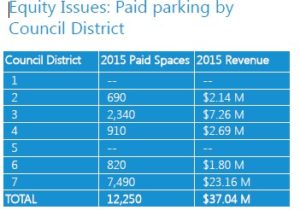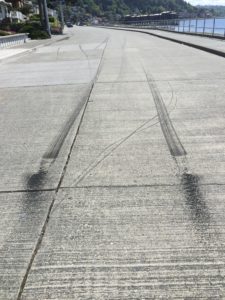Secure Scheduling Update, Appointment of New SPU Director, SDOT report on Parking Benefit Districts, Beach Drive SW Speed Bumps, North Precinct
Secure Scheduling Update
As you may recall, the deliberations about this policy started last March. Professor Susan Lambert of the University of Chicago presented on problematic scheduling practices, including an increase in the use of part-time employees, just-in-time scheduling (real time schedule adjustments), and an increase in pressure to “stay within hours” due to tight labor budgets. All of this leads to scheduling unpredictability and volatility, a higher headcount of part-time workers, and fewer hours on average worked for each employee.
Since March the Mayor’s Office has had 17 stakeholder meetings which were each followed by a report out to my committee. We’ve met with numerous individuals, including business owners, workers, and worker advocates.
On September 7 we discussed and passed nine amendments which were mostly technical, you can see those here. On September 13 we heard several additional amendments, which did not substantively change the ordinance, and voted 5 to 0 to send the bill to Full Council as amended. You can watch that September 13 committee meeting here.
I would encourage you to check out this website which details the ordinance: what the problem is, the solution, who it effects, and how it works. Here are the main policy points in the legislation:
- Businesses are only covered if they have 500+ employees (and 40 locations for full-service restaurants)
- 14 days advance notice for schedules
- Written good faith estimate of hours at time of hire
- 10 hours right to rest between closing and opening shifts (similarly to overtime, this can be voluntarily waved for time and a half wages for the time less than 10 hours)
- Predictability pay of one hour of wages only for non-employee requested schedule additions
- Half time pay for involuntary reduction in scheduled work hours and on-call shifts
- Access to additional hours for existing employees before outside recruitment and hiring
- Exceptions for diversity and seasonal hiring
The bill will have a final vote before the Full Council this coming Monday at 2pm. You can watch Full Council live at this link.
Finally, if you’d like to read more, see this op-ed that I co-authored with Councilmembers Gonzalez and Juarez near the beginning of this process.
Appointment of New SPU Director
Today in my committee meeting we heard from the Mayor’s nomination for the Seattle Public Utility Director, Mami Hara, and voted unanimously to support her appointment, sending it to Full Council on September 26 for a final vote. Prior to this meeting we sent Ms. Hara several questions, you can review those and her answers here.
This confirmation process began in late July. Shortly after Director Ray Hoffman announced his retirement, the Mayor announced his nominee for the Director of SPU, Mami Hara. Ms. Hara previously worked as Chief of Staff at Philadelphia Water, a 2,000 person utility serving more than 2 million customers, with a $700 million annual operating budget and a $6 billion Capital Improvement Program.
Green City, Clean Waters (Philadelphia’s plan to reduce storm water pollution) is one of the nation’s most ambitious green infrastructure program and its successes are helping to design national practice. Seattle has long been a leader in this field and her experience will help us to continue defining best practice.
SDOT Report on Parking Benefit Districts
Next Tuesday the Transportation Committee will discuss a 2015 Council Statement of Legislative Intent (SLI) requesting analysis about creating a parking district in Capitol Hill. A parking district would allocate a percentage of the parking revenue to stay in that area.
 SDOT recommends in their SLI response to not create a parking district in Capitol Hill or anywhere else, because some parts of Seattle, like West Seattle (District 1) and North Seattle (District 5), don’t have paid parking, so parking districts, by their nature, would create an inequity issue, because realistically most of the funding would go to Downtown and Belltown. $23 million of the City’s $37 million in 2015 parking revenue comes from District 7, primarily Downtown and Belltown (see table on right).
SDOT recommends in their SLI response to not create a parking district in Capitol Hill or anywhere else, because some parts of Seattle, like West Seattle (District 1) and North Seattle (District 5), don’t have paid parking, so parking districts, by their nature, would create an inequity issue, because realistically most of the funding would go to Downtown and Belltown. $23 million of the City’s $37 million in 2015 parking revenue comes from District 7, primarily Downtown and Belltown (see table on right).
In addition, SDOT says it would be “contrary to Council’s 2010 establishment of Performance-Based Parking Program.” The Council passed these policies in 2010, and incorporated them in SMC 11.16.121, which governs parking rates on city streets. SDOT completed a “Performance Based Parking” study in 2011.
Paid parking, by policy is added to those areas identified as lacking in parking capacity. Specifically, SDOT policy is designed to ensure availability of 1-2 open spaces per blockface (i.e. one side of a block). SDOT updates rates based on annual review of the areas with paid parking; they also conduct parking studies of other neighborhoods. SDOT studied parking in the West Seattle Junction in 2009 and didn’t recommend any paid parking.
Additional materials are linked to the meeting agenda.
Beach Drive SW Speed Bumps
 I’ve been working to assist residents on Beach Drive SW to address the high incidence of drag racing (see video) and driving that is dangerous to public safety. The racing has been happening in the portion of Beach Drive SW that extends south from the lighthouse. The neighbors have requested the installation of speed bumps.
I’ve been working to assist residents on Beach Drive SW to address the high incidence of drag racing (see video) and driving that is dangerous to public safety. The racing has been happening in the portion of Beach Drive SW that extends south from the lighthouse. The neighbors have requested the installation of speed bumps.
Earlier this year community members began the process of applying for funds through the Neighborhood Parks and Street Fund. I wrote a letter to SDOT requesting that they consider traffic calming measures to address the drag racing.
SDOT has agreed to install three speed bumps. Installation could take place later this year, but will depend on dry, warm weather.
North Precinct
Yesterday the Mayor and three Councilmembers announced the City would not proceed with the Seattle Police Department North Precinct project in the 2017 budget, and would not propose a bond sale to finance the construction in the 2017 budget. I think this is a good step.
It will allow the Council to consider legislation to reform police accountability in advance of any consideration of the North Precinct, and place consideration of the North Precinct where it belongs, in a broader context, with a clearer understanding of what facilities will be required.
The Council passed a resolution on the North Precinct in August. At the request of community members, I proposed a Racial Equity Toolkit analysis be included in the resolution. I further proposed removing the $149 million dollar figure from an earlier version of the resolution; I feared that committing to a specific dollar figure might draw a line in the sand that would make it difficult to step back, especially if it received majority backing from the Council. Both changes were made; I wouldn’t have been able to support the $149 figure.
This issue had the potential to destabilize the City’s 2017 budget process, since ¾ Council approval—7 of 9 votes—is needed to adopt the budget. This could have proven a stark challenge.
Councilmember Johnson and I have called for a special Council committee to oversee City-funded capital projects. I look forward to continuing this work during the Council’s budget process, which begins with the Mayor’s budget proposal on September 26.
As part of my review of the proposal, I requested information from the Executive about the City’s other four police precincts, and their projected life span, and and future potential costs associated with long-term maintenance. The Department of Finance and Administrative Services cautioned that the information they provided should not be used for budgeting purposes, and is designed to provide a general sense of building conditions, but it is useful. Here’s what I received for the Southwest, South, East, and West precincts.
Posted: September 16th, 2016 under Councilmember Herbold, District 1, Libraries, Office of Police Accountability, Parks and Recreation, Police Department, Seattle Public Utliities, Transportation, Utilities
Tags: Beach Drive, District 1, North Precinct, parking, secure scheduling, Utilities

